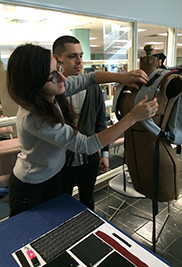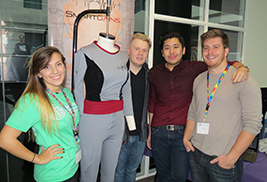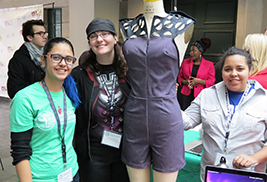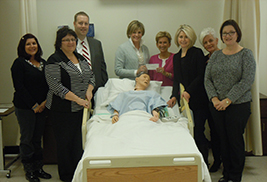Featured Article
Kent State University at Trumbull Nursing Program Earns Grant
The Women’s Auxiliary at Trumbull Memorial Hospital presented Kent State University at Trumbull’s nursing program with a grant, which will be used for the purchase of a virtual intravenous simulator.
read moreFashion/Tech Hackathon Produces Wearable Technology Inventions
Posted Feb. 16, 2015 | Kate HarmonTop prize goes to hands-free GPS navigational backpack

Olivia Burca and Richard Monroy
demonstrate Roame, the GPS
navigational backpack. Roame, which
won first place in Kent State University’s
Fashion/Tech Hackathon, was developed
by a blended team of students from New
York City’s Parsons The New School for
Design and the State University of New
York at Buffalo.
Despite a powerful snow storm that temporarily closed down the Kent Campus, students from around the U.S. converged at Kent State University to develop wearable technology prototypes during the weekend of Jan. 30-Feb. 1 at the only collegiate wearable technology hackathon in the nation.
Led by Kent State’s Blackstone LaunchPad and the Fashion School’s TechStyleLAB as part of a wider collaborative cross-campus effort to develop “wearables” innovations at Kent State, the Fashion/Tech Hackathon weekend saw 144 participants from 19 universities representing 23 different majors join together to create wearable technology prototypes over 38 hours in the Fashion School’s Rockwell Hall.
“Hackathons allow us to jump start the wearables developer community," says Patrick Henshaw, co-founder and COO of Strap, a Cincinnati-based wearable company and sponsor of Fashion/Tech Hackathon weekend. "We’ve taught students JavaScript and helped them build their first wearable apps in under 38 hours. Those students then become ambassadors for everything they learned in one weekend and help drive more creativity and more energy towards developing for wearables.”
Thirty Innovations in One Weekend
The weekend’s hackathon produced 30 projects and featured a record 60 percent female participation rate, an usually high rate for hackathon involvement. The winning invention, “Roame,” a backpack with vibration-based GPS navigation, was developed by a blended team of students from New York City’s Parsons The New School For Design and the State University of New York at Buffalo, and included Olivia Burca, Richard Monroy and Monica Magliari, fashion students from Parsons, and Edward Poon, a computer science major at SUNY-Buffalo.
The backpack allows users to input their destination and GPS navigate through a space based on the directional vibrations of the backpack straps, thereby allowing for hands- and mobile-free navigation through cities. The development and fulfillment of the idea in itself was a journey in collaboration and team-building.

A team from Kent State University won second place and
the TechStyleLAB award in the university’s Fashion/Tech
Hackathon with “SmartGains,” a biometric wearable
workout suit that measures one’s workout proficiency.
Pictured (from left to right) are Kent State students
Jessica Musto, Gerald Hopper, Julien Remi
Nguyen and AJ Morganti.
“We met on the NYC bus to Kent State's fashion hackathon and clicked very well,” says Poon, co-founder of the winning innovation. “We started brainstorming and came up with the vibrating GPS backpack idea. We encountered a lot of tech problems but with all the amazing feedback from this weekend, we are going to take it further. My team is currently looking for mentors to take our idea to the next level, and hopefully people will see us soon on a crowdfunding site like Kickstarter or Indiegogo, but under a new name.”
Other winning projects included “SmartGains,” a biometric wearable workout suit that measures a user’s workout proficiency, created by a Kent State team, which won second place and the TechStyleLAB award, and “Geoelectrics,” a garment that displays musical vibrations through synchronized LED lights, which won third place and was created by a blended team from Stephens College and Kent State. Sponsor awards included Strap best use of API for “Bouncer,” a wearable that interfaces with drones, and “Pebble Spreeder,” which allows one to speed read using a pebble; Hacksu’s most technical hack for “LightPrint,” a dress that incorporated digital fabric and 3-D printing; and the Fashion Student Organization Award to “Empowering,” a wearable that helps prevent violence.
Encouraging Innovation Excellence
“We strive for innovation excellence, and being a part of this unique creative development process stimulates new thinking — great ideas can get their start at events like this,” says Victoria Scarborough, Ph.D., program director of External Technology Global Resource Team of Sherwin Williams, a sponsor and judge for the event. Other judges for the event included Rob Heiser, president and CEO of Segmint Inc.; Bahman Taheri, Ph.D., CEO of Kent-based AlphaMicron; Jason Block, front-end developer for Trunk Club; Jeff Kantarek, apprentice engineer with Trunk Club; Cevin Cole, vice-president of strategy and operations for Flexible I.T.O. Solutions; and Clinton Braganza, Ph.D., senior scientist with Kent Displays Inc.

“GeoElectrics,” a garment that displays musical vibrations
through synchronized LED lights, won third place in Kent
State University’s Fashion/Tech Hackathon. The garment
was created by a blended team from Stephens College in
Columbia, Missouri, and Kent State. Pictured (from left to
right) are Aanchal Bakshi, Meredith Morrow and Brittany
Grayson.
The fashion- and technology-focused weekend also included an academic research symposium sponsored by the TechStyleLAB, a regional business alley and Women + Tech workshops for middle, high school and collegiate females. The Sherwin Williams Keynote Speaker was Chris Wentz, founder and CEO of EveryKey, a Case Western Reserve University Blackstone LaunchPad wearable business that allows users to wear their passwords for multiple devices on their wrists. Additionally, TeamNEO, a technology-focused economic development organization, convened companies from Northeast Ohio and across the country to kickoff the Wearable and Embedded Technologies Consortium (WETeC).
All participants felt the impact of the weekend’s activities.
“Working with the fashion students made me realize that there really isn't much of a difference between fashion students and hackers,” Poon says. “We all go through the same process of designing, planning and implementation. I have a much bigger appreciation for the students who work in the fashion industry after this event.”
For more information about the results of Fashion/Tech Hackathon weekend, visit www.fashiontechhackathon.com.
For more information about Blackstone LaunchPad at Kent State, visit http://www2.kent.edu/blackstonelaunchpad/index.cfm.
For more information about the Fashion School’s TechStyleLAB, visit www.tech-style-lab.org.
